Launch of 2017 Foreign Policy White Paper: Advancing Australia’s interests
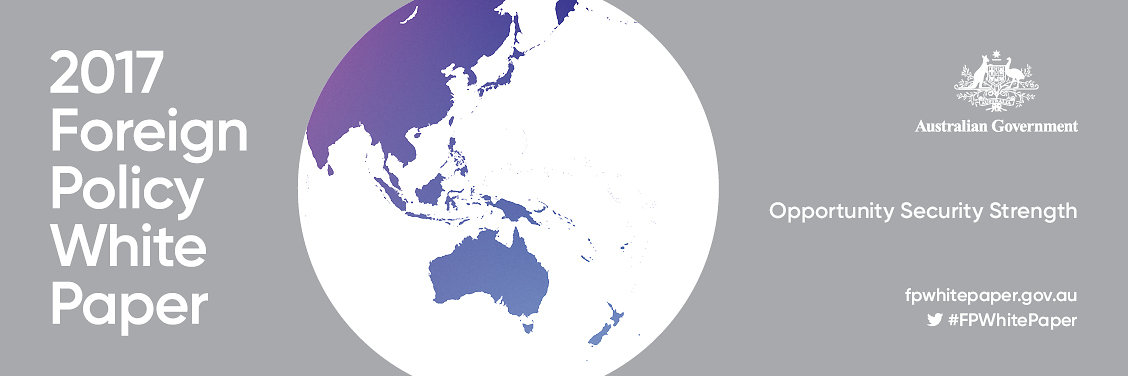
On 23 November, the Hon Malcolm Turnbull MP, Prime Minister of Australia, officially launched the Foreign Policy White Paper, the first comprehensive policy paper on Australia’s international engagement since 2003. The White Paper provides a roadmap for advancing and protecting Australia’s international interests, and sets out the strategy of the Government of Australia for engaging with the world over the next decade. The Foreign Policy White Paper is the result of an unprecedented level of public consultation, drawing on the views of local communities, business, academics and think tanks, and federal, state and local governments. For more information, please refer to www.FPWhitePaper.gov.au
Celebration of Australian – Austrian botanical links
Launch of online exhibition of Australian flora and fauna by Austrian botanical artist Ferdinand Bauer
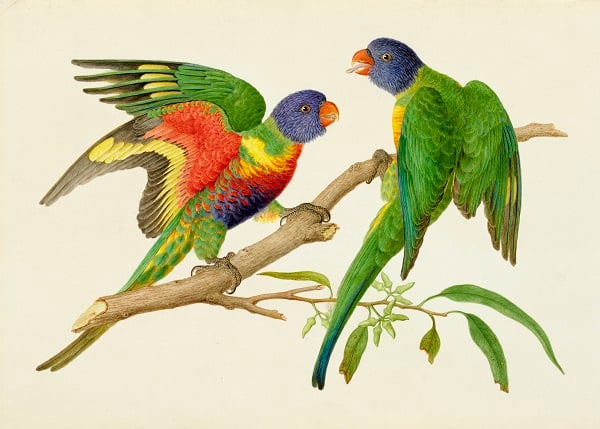
Rainbow lorikeet, watercolour, Ferdinand Bauer, based on pencil sketch made at Port Phillip, April 1802. Natural History Museum London.
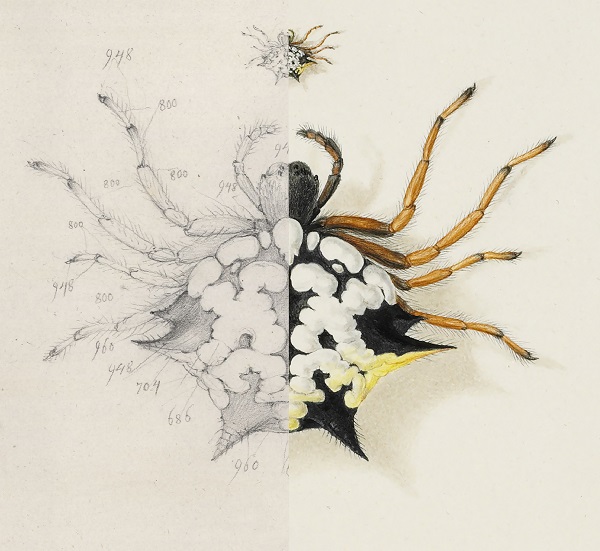
Christmas spider, 1805, field drawing/watercolour, Ferdinand Bauer. Natural History Museum Vienna/Natural History Museum London.
The State Library of New South Wales launched a ground-breaking new website on 16 November 2017 featuring more than 300 rarely seen works by Austrian Ferdinand Bauer (1760-1826) - one of the world’s greatest natural history artists. It is part of a unique project embracing both print and digital technology. Bauer’s exquisite pencil sketchings of Australian flora and fauna, his extraordinary colour-coding system and pioneering field work come to life in the Painting by Numbers website and in a book published by botanical scholar Professor David Mabberly entitled Painting by numbers: the Life and Art of Ferdinand Bauer.
Ferdinand Bauer drew Australian birds, animals and plants during the first circumnavigation of the Australian continent under Captain Matthew Flinders from 1801-1803. He was acclaimed for capturing precisely the tone and shading of his specimens. “His mind worked at such speed that he could remember colours by number,” says Professor Mabberly. In 1817 Johann Goethe described the works, saying: “…we are enchanted at the sight of these leaves: nature is revealed, art concealed, great in its precision, gentle in its execution, decisive and satisfying in its appearance”.
The Natural History Museum Vienna, which owns more than 2,000 of Bauer’s pencil drawings, is a key contributor to this current project together with the State Library of NSW, the Bodleian Libraries Oxford, the Royal Botanic Gardens in Kew, the Natural History Museum London and the Linnean Society in London.
Visitors to the Painting by Numbers website will be able to view the incredible detail in Bauer’s work, experiment with his signature palettes and see how he turned his field drawings into fully realised and detailed studio watercolours.
See also media releases from State Library NSW and Natural History Museum Vienna.
Statement to the 49th Session of the CTBT Preparatory Commission: 13 November 2017
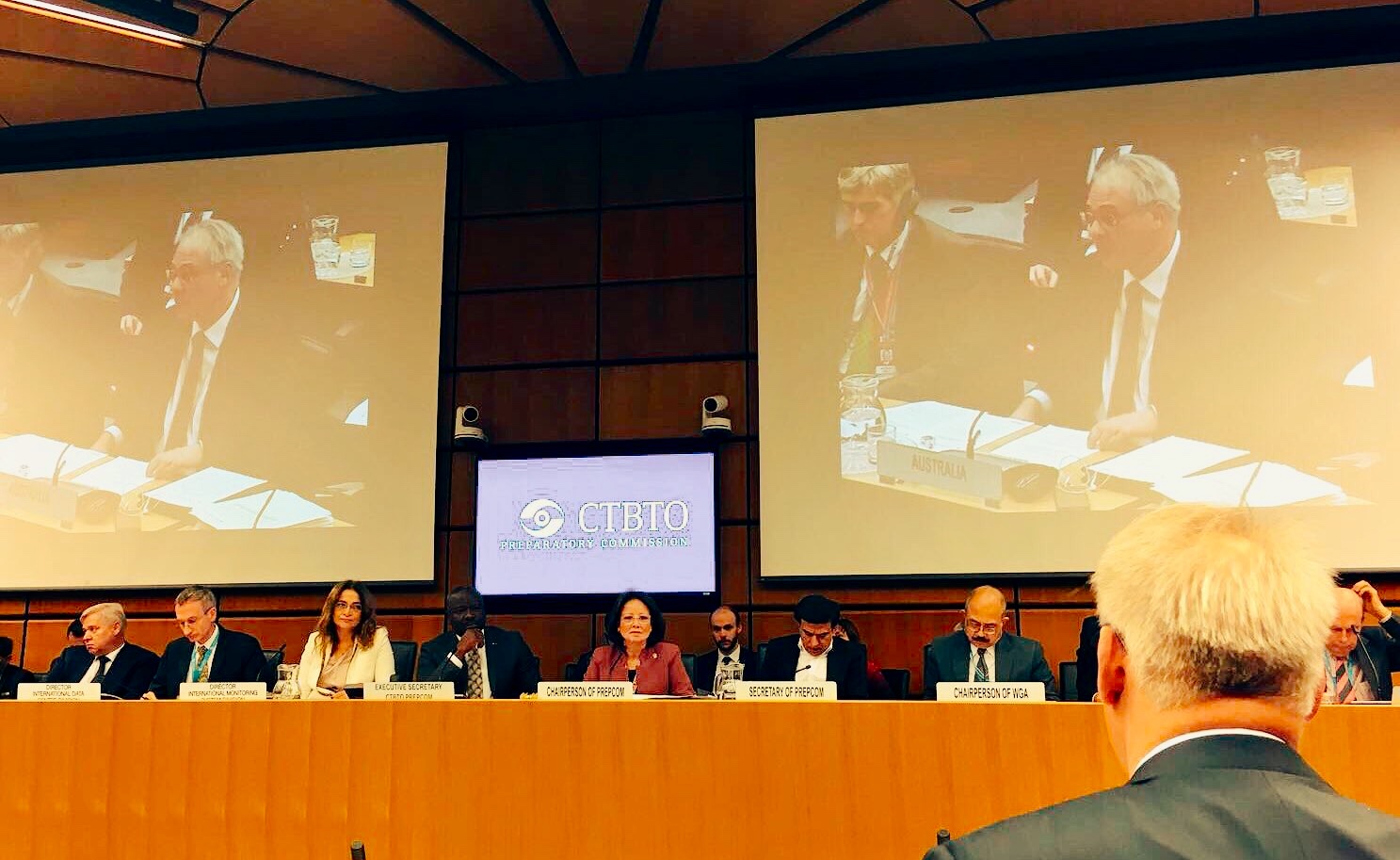
On 13 November, Ambassador HE Dr Brendon Hammer, Resident Representative to the Comprehensive Nuclear Test Ban Treaty Organisation (CTBTO), delivered the Australian National Statement to the 49th Session of the CTBT Preparatory Commission. For the statement, please refer here. Copyright: Australian Embassy.
Remembrance Day 2017
Image caption: On 11 November, Ambassador Dr Brendon Hammer attended Remembrance Day commemorations at the Commonwealth War Graves cemetery at Klagenfurt, in Austria. Copyright: Australian Embassy.
On Remembrance Day, a minute’s silence is held in many parts of the world to remember the servicemen and women who gave their lives in wartime and during conflicts and peacekeeping operations. Remembrance Day is held on 11 November, the date which commemorates the anniversary of the Armistice which ended the First World War in 1918.
The Australian Embassy in Vienna is accredited to six countries, two of which have Commonwealth War Graves in which Australian servicemen are buried: the cemetery at Klagenfurt in southern Austria, and the cemetery at Solymár, a short drive to the north of Budapest in Hungary. There is a third cemetery at Maribor in central Slovenia where many Allied servicemen are buried. This cemetery does not contain marked graves for Australians, but does contain the graves of a large number of unidentified soldiers. The Australian Embassy, Vienna attended commemorative services in Klagenfurt and Solymar and a Remembrance Day Church Service in Vienna.
For more information, please refer to www.anzacportal.dva.gov.au and www.dva.gov.au.
Australia’s Participation in the 7th Session of the Conference of States Parties to the United Nations Convention against Corruption
Photo caption: On 7 November, Luke Arnold, Director, Law and Justice Section, Governance Fragility & Water Branch, Department for Foreign Affairs and Trade (DFAT), delivered Australia’s national statement to the 7th session of the UNCAC Conference of States Parties.
Photo caption: Ambassador Dr Brendon Hammer (seventh from left) with the Hon Taneti Maamau (sixth from left), President of Kiribati and other Pacific colleagues; (l-r) Wanni Teo, NZ Permanent Mission Vienna; Eric Iban, Office of the Attorney General, RMI; Leonito Bacalando, Ministry of Justice, FSM; John Brandolino, UNODC; Sa'aga Talu Teafa, Chief Ombudsman, Tuvalu; the Hon Taneti Maamau; Ambassador Dr Brendon Hammer; Mihaela Stojkoska, UN-PRAC; Graham Leung, Secretary, Justice & Border Control, Nauru; Setariki Waganitoga, Office of the Prime Minister, Vanuatu; Derek Futaiasi, Office of the Prime Minister, Solomon Islands; Catherine Evans, Deputy Solicitor General, Cook Islands; Maria Adomeit, UN-PRAC.
Photo caption: Luke Arnold, Director, DFAT, participates as a panellist in a side-event on “Understanding the Links between Corruption and Violent Extremism.”
Australia participated in the 7th session of the Conference of States Parties to the United Nations Convention against Corruption (UNCAC CoSP) in Vienna from 6 to 10 November 2017. A copy of Australia’s national statement can be found here.
Australia highlighted the impact corruption has on our economic, security and development interests and encouraged member states and civil society to work together to combat it.
Australia’s Investment in Anti-Corruption
As one of the world’s leading anti-corruption donors, Australia has agreed to provide more than $20 million in funding to anti-corruption programmes over the next four years. Australia will fund the UN Office on Drugs and Crime (UNODC) and the UN Development Program (UNDP) to work with states parties to prevent and combat corruption, as well as the World Bank-UNODC Stolen Asset Recovery Initiative, which assists countries to recover assets stolen through corruption.
Within our region, Australia has been a strong supporter of the UN Pacific Regional Anti-Corruption Project (UN-PRAC), which supports Pacific Island Countries strengthen their capacity to address corruption.
Indigenous Australia at World Museum Vienna Grand Reopening
_Daniel Auer.jpg)
_Daniel Auer.jpg)
Image caption: Koomurri dance group at World Museum Vienna Reopening. Copyright: Daniel Auer.
The Australian Koomurri dance group featured as part of an open-air show to celebrate the re-opening of the World Museum in Vienna on 25 October. Diversity, tolerance, respect and cooperation were key themes of the show attended by over 7,500 guests and broadcast nationally on television. Ambassador Dr Brendon Hammer, Embassy staff and friends attended the show which was opened by Austrian President Alexander Van der Bellen and featured other performers from Austria, Bosnia and Herzegovina, India, Iran, Mexico, Mongolia, South Africa, Switzerland and Zimbabwe.
Representing the world’s longest surviving continuing culture and with members hailing from a variety of clans in New South Wales, Queensland and the Torres Strait, the seven Koomurri members brought Australian Indigenous culture to Austria through a mix of traditional and contemporary dance accompanied by didgeridoo music. Koomurri recently won the 2016 national Aboriginal Dance Rites competition and have performed at the Adelaide Fringe Festival and Australia Day at Barangaroo and Circular Quay. Prior to their performance in Vienna, Koomurri members also performed at a major Festival in Hungary.
The World Museum Vienna is one of the leading ethnographic museums in the world and has undergone three years of reconstruction. Among its feature displays are segments of the James Cook collection as well as Australian artefacts and objects collected by others, including the Habsburg Crown Prince Franz Ferdinand during his Australia visit in 1893. The Museum’s newly restored facilities and displays are dedicated to the cultural diversity of humankind and the diverse historical ties between Austria and other regions around the world.
Milestone achieved: Australia-Austria Work and Holiday arrangement signed
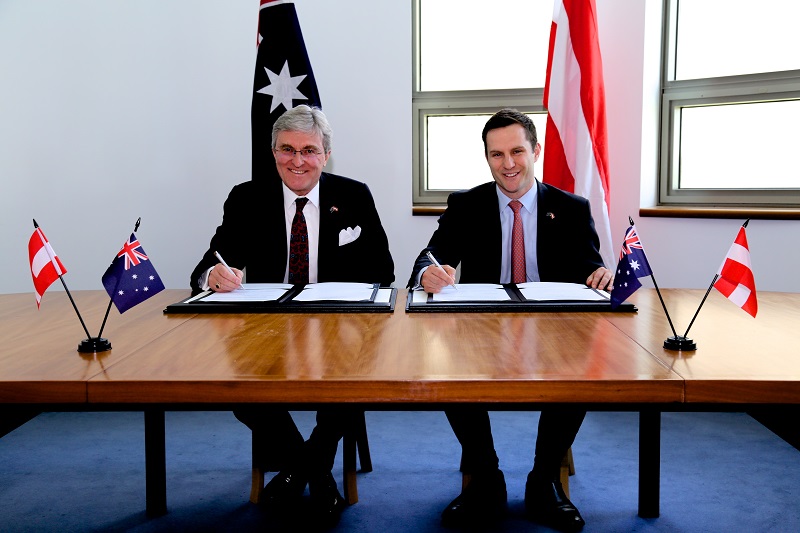
Photo caption (l-r): Austrian Ambassador HE Dr Bernhard Zimburg and Australian Assistant Minister for Immigration and Border Protection, the Hon Alex Hawke MP at the signing of the Australia-Austria Work and Holiday arrangement.
Australian Assistant Minister for Immigration and Border Protection, the Hon Alex Hawke MP, and Austrian Ambassador to Australia, HE Dr Bernhard Zimburg signed a bilateral Work and Holiday arrangement on 19 October. The arrangement provides a unique cultural, social, linguistic and intellectual experience for young adults. Once implemented up to 200 young people each year from both Australia and Austria will be able to holiday and work under this arrangement. The arrangement is a tangible affirmation of our countries’ expanding and deepening links.
Work has started on the implementation of the arrangement and once implemented the Department of Immigration and Border Protection’s website will be updated to advise eligible nationals from Austria that they are able to apply for a visa.
See also https://m.facebook.com/story.php?story_fbid=2067848760112207&id=1466035070293582
Visit by His Excellency the Governor-General of the Commonwealth of Australia and Her Excellency Lady Cosgrove to Hungary and Austria
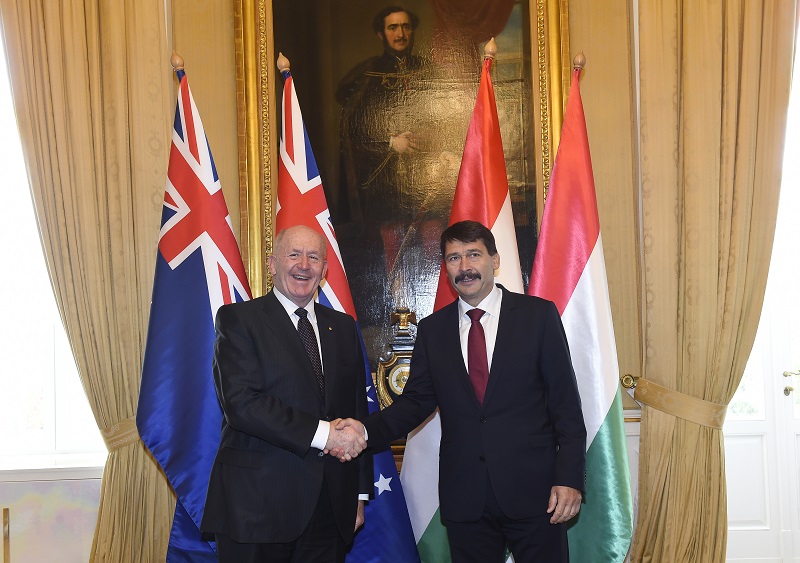
Image caption: On 27 September, HE General the Honourable Sir Peter Cosgrove AK MC (Retd), Governor-General of Australia, met with HE János Áder, President of Hungary, at Sándor Palace, Budapest. Copyright: Office of the Hungarian President.
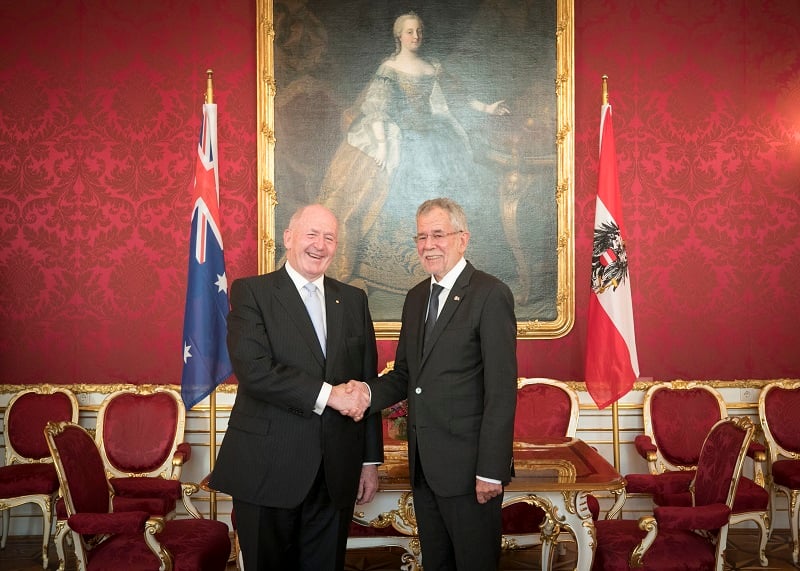
Image caption: On 29 September, HE General the Honourable Sir Peter Cosgrove AK MC (Retd) met with HE Alexander Van der Bellen, Federal President of the Republic of Austria, at Hofburg Palace. Copyright: Office of the Austrian President.
From 27 to 30 September, His Excellency General the Honourable Sir Peter Cosgrove AK MC (Retd) and Her Excellency Lady Cosgrove visited Hungary and Austria.
The State visit to Hungary was the first ever by a serving Australian Governor General. Their Excellencies met with Hungarian President HE János Áder and HE Anita Herczegh, as well as Mr László Kövér, Speaker of the National Assembly for bilateral discussions. The Governor General also met with Mr András Heisler, President of the Federation of Jewish Communities in Hungary (Mazsihisz), and Chief Rabbi Dr Róbert Frölich at the Great Synagogue in Budapest, and their Excellencies laid a wreath at the Commonwealth War Graves Cemetery in Solymár in memory of 13 Australian RAAF soldiers killed in World War Two. Their Excellencies also met with members of the Australian community in Hungary in recognition of the close people-to-people links which underpin the warm and friendly relations between Australia and Hungary.
The Governor-General and Lady Cosgrove met with HE Alexander Van der Bellen, Federal President of the Republic of Austria for bilateral discussions during their official visit to Austria. The Governor General also met with HE Ambassador Thomas Greminger, Secretary General of the Organisation for Cooperation and Security in Europe (OSCE), and Mr Yury Fedotov, Director-General of United Nations Office at Vienna (UNOV), and Executive Director of the United Nations Office on Drugs and Crime (UNODC). These calls highlighted Australia’s commitment to the multilateral system for addressing today’s complex global security challenges. Their Excellencies met with members of the Australian community in Austria, many of whom are working with key international organisations, including the United Nations, International Atomic Energy Agency (IAEA), Comprehensive Test Ban Treaty Organisation (CTBTO), or contributing to Vienna’s rich culture and artistic scene.
Australia's National Statement to the 61st IAEA General Conference
On 19 September 2017, Australia's Head of Delegation, Ambassador Brendon Hammer, Governor and Permanent Representative to the International Atomic Energy Agency (IAEA), delivered Australia's statement to the 61st Regular Session of the IAEA General Conference. Read the statement here.
Australia's National Statements to the September IAEA Board of Governors meeting on Iran and on DPRK
On 12 and 13 September, Ambassador HE Dr Brendon Hammer, Resident Representative to the International Atomic Energy Agency (IAEA), delivered the Australian National Statements on Iran and on North Korea to the September IAEA Board of Governors meeting in Vienna. For Australia's statement on Iran, please refer here. For Australia's statement on North Korea, please refer here.
Australia National Statement to the Resumed 48th Session of the CTBT Preparatory Commission on DPRK Announced Nuclear Test: 4 September 2017
On 4 September, Ambassador HE Dr Brendon Hammer, Resident Representative to the Comprehensive Nuclear Test Ban Treaty Organisation (CTBTO), delivered the Australian National Statement condemning North Korea's announced nuclear test. For the statement, please refer here.
OSCE Asian Contact Group Meeting – “The Indo-Pacific Security Dynamic”
The Indo-Pacific region is experiencing the greatest surge of growth and human development in history. This ongoing process has already shifted the world’s centre of economic gravity from trans-Atlantic to trans-Pacific, with the Indo-Pacific becoming the world’s main growth engine. This remarkable transformation has been made possible through a sustained regional peace, itself made possible through broad adherence of regional states to a rules-based approach to international affairs. Because of the region’s rapidly expanding economic and strategic scale, the way the Indo-Pacific security dynamic evolves will have major implications beyond Asia, including for collective security in the OSCE region and globally.
On Friday 7 July, Mr Robert McKinnon, Assistant Secretary, Strategic Issues and Intelligence Branch (DFAT), spoke at the OSCE Asian Contact Group Meeting on the topic “The Indo-Pacific Security Dynamic”. The meeting was co-hosted by the Delegation of Australia and the Delegation of the Federal Republic of Germany, and presented an opportunity to inform development of higher levels of cross-regional awareness and cooperation among trusted partners and friends in the OSCE and the Indo-Pacific regions.
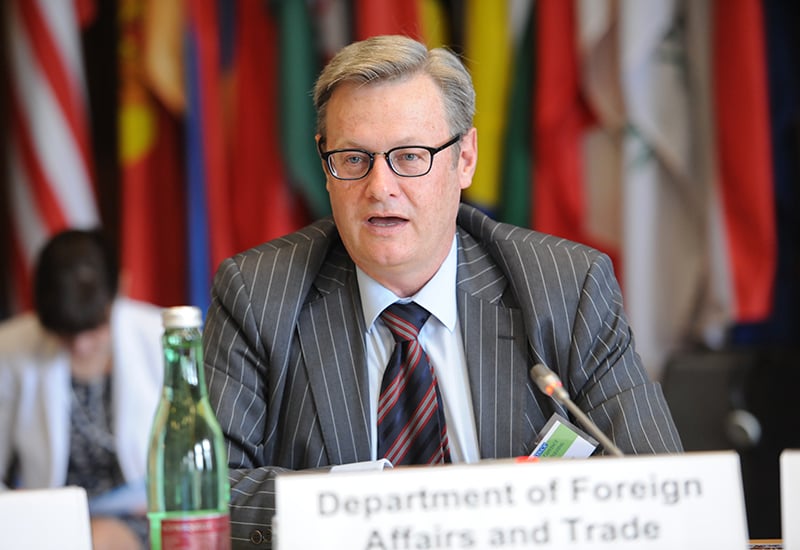
Caption: On 7 July, Mr Robert McKinnon, Assistant Secretary, Strategic Issues and Intelligence Branch at the Australian Department of Foreign Affairs and Trade (DFAT), spoke at the Asian Contact Group Meeting on the topic “The Indo-Pacific Security Dynamic”. Copyright: OSCE/Kroell.
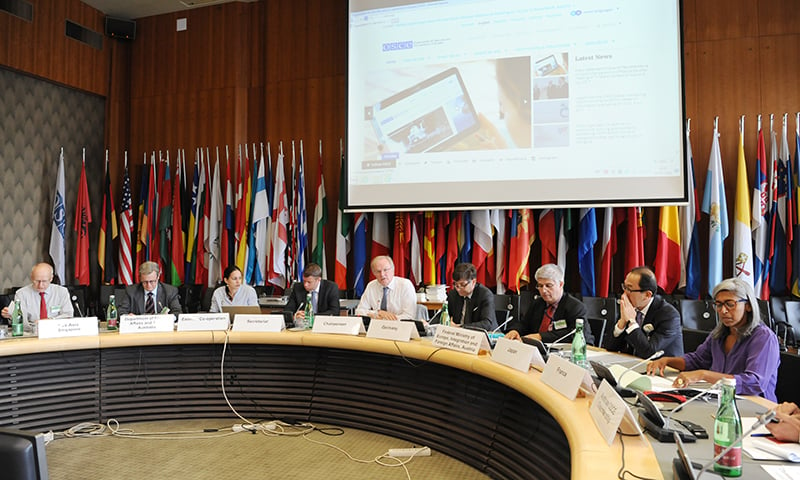
Caption (l-r): Dr Tim Huxley, Executive Director, International Institute for Strategic Studies IISS-Asia; Mr Robert McKinnon, Assistant Secretary, DFAT; Ms Marietta S. König, External Co-operation Officer, OSCE; Mr Milorad Cukic, Conference Services, OSCE; HE Ambassador Eberhard Pohl, Germany; Mr Matthias Friese, Counsellor, German Embassy; Dr Wilhelm Donko, Minister and Head of Unit Eastern Asia, Australia/Oceania, and ASEM, Federal Ministry of Foreign Affairs, Austria; HE Ambassador Kiyoshi Koinuma, Japan; HE Ambassador Mrs Véronique Roger-Lacan, France. Copyright: OSCE/Kroell.
Pride 2017 in Bratislava, Košice, Budapest and Vienna
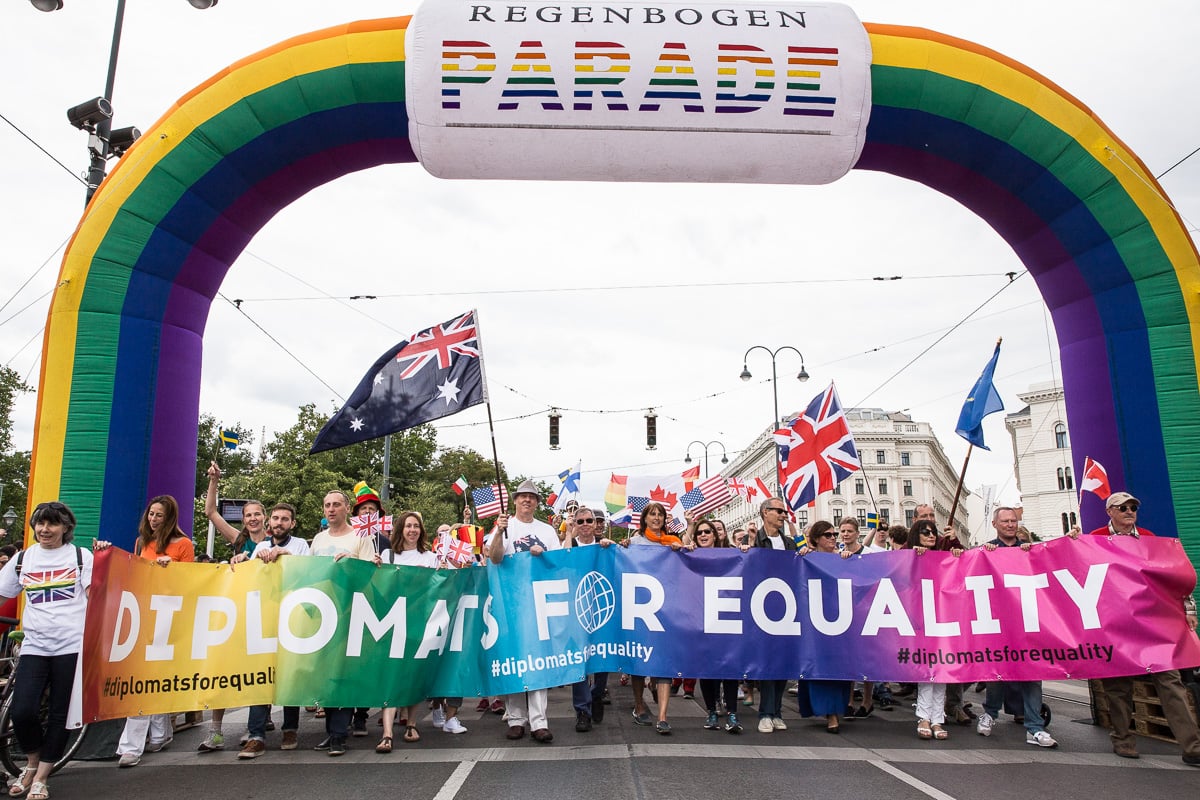
Caption: Ambassdor Dr Brendon Hammer and diplomatic colleagues at Vienna Pride 2017. Copyright: Australian Embassy.
Caption: Australia is a candidate for the United Nations Human Rights Council and supports respect and non-discrimination against LGBTI persons. Embassy staff, family and friends at Vienna Pride 2017. Copyright: Australian Embassy.
Australia is committed to promoting respect and non-discrimination against Lesbian, Gay, Bisexual, Transgender, Queer and Intersex (LGBTQI) persons, including through our work in international organisations and fora. As set out in the International Universal Declaration of Human Rights, it is Australia’s position that all individuals are entitled to the same rights and freedoms.
In joint statements in Bratislava, Košice, Budapest and Vienna, the Australian Embassy, together with other diplomatic missions, reaffirmed opposition to all forms of discrimination, including on grounds of sexual orientation and gender identity, and underscored Australia’s commitment to diversity, respect and inclusion for all people including members of the LGBTQI community.
In the Slovak Republic, the Australian Embassy joined the statement of 23 Diplomatic Missions in the support of Pride Marches in Bratislava on 19 August and in Košice on 2 September 2017.
Please read the joint statement issued on 17 August here.
In Hungary, the Australian Embassy joined the statement of 36 Diplomatic Missions in the support of the 22nd Budapest Pride Festival taking place from 30 June – 9 July 2017.
Please read the joint statement issued on 6 July here.
In Austria, 30 diplomatic missions signed the common statement. In addition, Ambassador Dr Brendon Hammer, Australian Embassy staff, family members and friends joined members of other Embassies, Delegations and Permanent Missions in Vienna to march as Diplomats for Equality at the Vienna Pride festival “Many colours – one community” on Saturday 17 June 2017, together with an estimated 185,000 participants.
Please read the joint statement issued on 13 June here.
Launch of International Gender Champions Initiative (GCI) Vienna
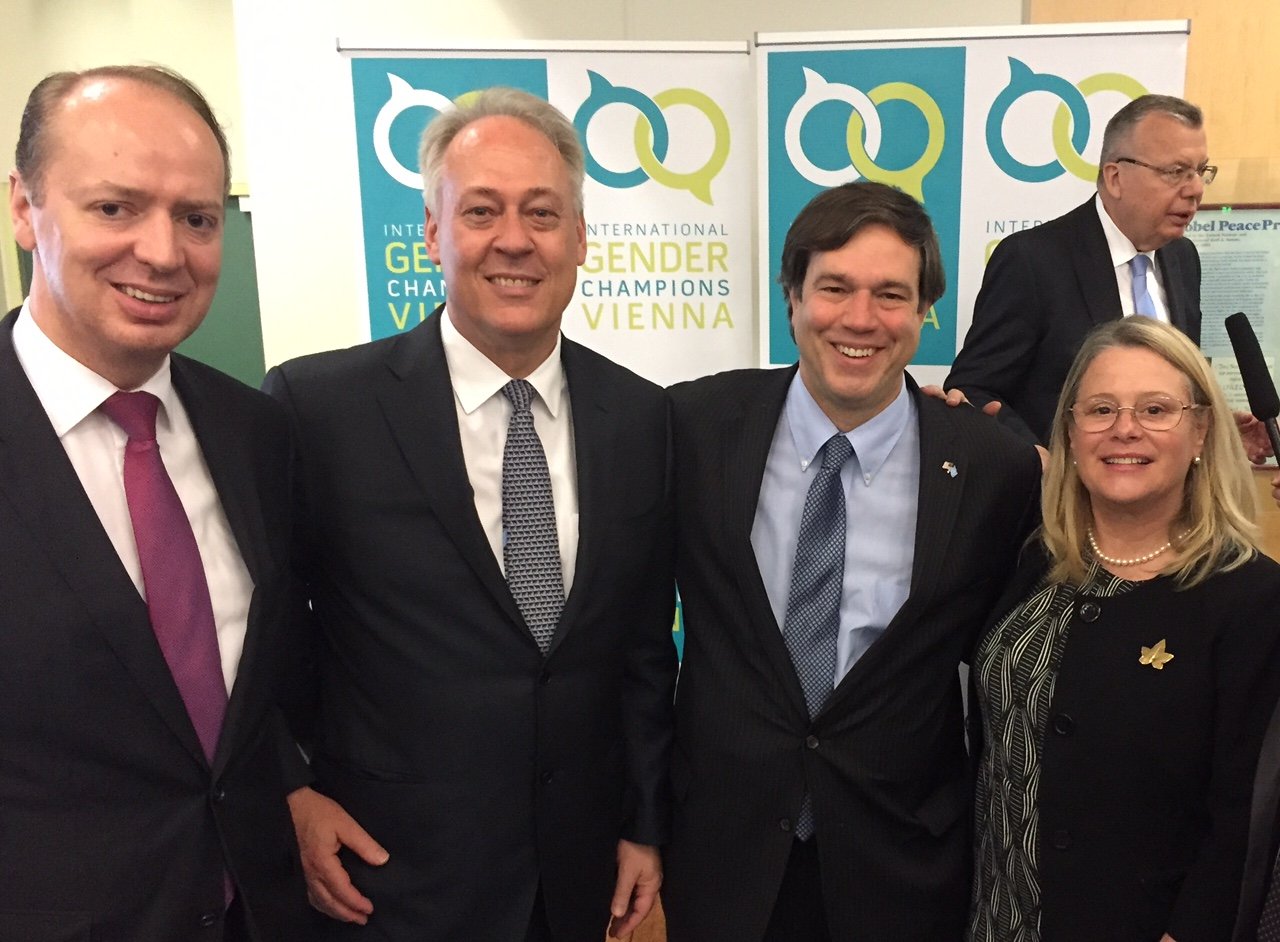
Photo caption (l-r): HE Ambassador Andrej Benedejcic, Permanent Representative of the Republic of Slovenia to United Nations in Vienna; Ambassador of Australia HE Dr Brendon Hammer; Chargé d’Affaires Andrew J. Schofer, U.S. Mission to International Organizations in Vienna; HE Ambassador Saborio de Rocafort, Embassy of the Republic of Costa Rica. Copyright: Australian Embassy.
Australian Ambassador and Permanent Representative, HE Dr Brendon Hammer, has joined the International Gender Champions Initiative – with a personal pledge to support gender parity on panels and to defend and promote gender equality through the following specific actions:
- Encourage greater representation of women in the IAEA including as co-chair of the “Group of Friends for Women in Nuclear”;
- Maintain gender parity as a key theme in Australia’s public diplomacy in Vienna;
- Encourage high-potential female colleagues and support their career progression;
- Support flexible, family friendly work arrangements for all staff at the Australian Mission in Vienna;
- Ensure recruitment panels for locally engaged colleagues are gender diverse;
- Identify and call out any activity or behaviour that is not inclusive.
The Vienna chapter of the International Gender Champions Initiative (GCI) was launched at the United Nations Office in Vienna on 14 June 2017. The GCI is a leadership network that brings together female and male leaders and decision-makers with a view to breaking down gender barriers. Fellow Gender Champions in Vienna include UNOV Director General Yury Fedotov, International Atomic Energy Agency (IAEA) Director General Yukiya Amano, Comprehensive Nuclear-Test-Ban treaty Organization (CTBTO) Executive Secretary, Lassina Zerbo, United Nations Office for Outer Space Affairs (UNOOSA) Director Simonetta Di Pippo, United Nations Industrial Development Organisation (UNIDO) Director General, Li Yong and Paul Bekkers of the Organisation for Security and Cooperation in Europe (OSCE) Office of the Secretary General. Heads of the Permanent Missions of Costa Rica, Slovenia, and the United States chair the Initiative in Vienna (see photo).
Australia’s Ambassadors and Permanent Representatives in New York, HE Ms Gillian Bird, and Geneva, HE Mr John Quinn are both already committed Gender Champions in the chapters of this Initiative already established in these centres.
Australia accepts the IAEA’s 2017 RCA Agreement on delivering results in the Peaceful Application of Nuclear Science and Technology
Photo caption: Ambassador HE Dr Brendon Hammer hands over Australia’s document of acceptance of the 2017 RCA Agreement to IAEA Director General Yukiya Amano. Copyright: IAEA.
The overarching goal of the IAEA’s Technical Cooperation (TC) Programme is to ensure that Member States enjoy maximum benefit from the peaceful uses of nuclear technology. TC Programme projects assist Member States in the fields of health and nutrition, food and agriculture, water and the environment, radiation technology and industrial applications, energy planning and nuclear power. The TC Programme also facilitates networking and knowledge sharing and the fostering of suitable development partnerships.
The International Atomic Energy Agency (IAEA) also strives to ensure that there is alignment between TC projects and the 2030 UN Sustainable Development Goals of Member States.
On Friday 9 June, Ambassador Dr Brendon Hammer deposited Australia's instrument of accession to a renewed “Regional Co-operative Agreement (RCA) for Research, Development and Training Related to Nuclear Science and Technology 2017”.
This renewed RCA will facilitate cooperation between the IAEA and its 22 Government Parties in research, development and training projects in nuclear science and technology and is a major mechanism by which the TC Programme provides benefit in Australia’s region. Australia has been an active partner in the IAEA’s TC Program since 1977. Australia’s engagement with the RCA is via the Australian Nuclear Science and Technology Organization (ANSTO).
Building Bridges: Australian Gondwana Indigenous Children’s Choir in Concert with Vienna Boys Choir
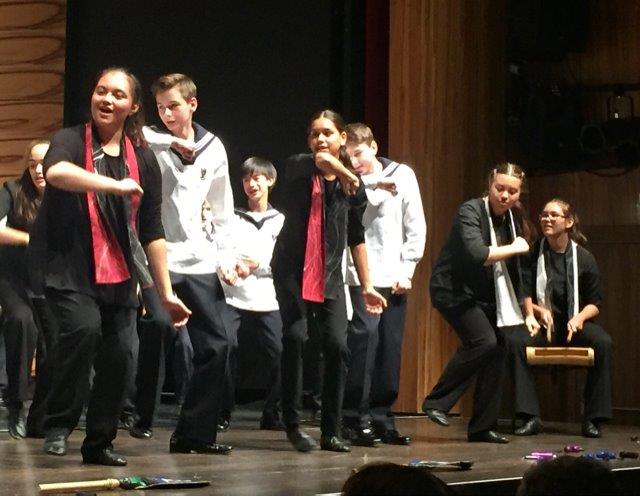
Copyright: Australian Embassy.
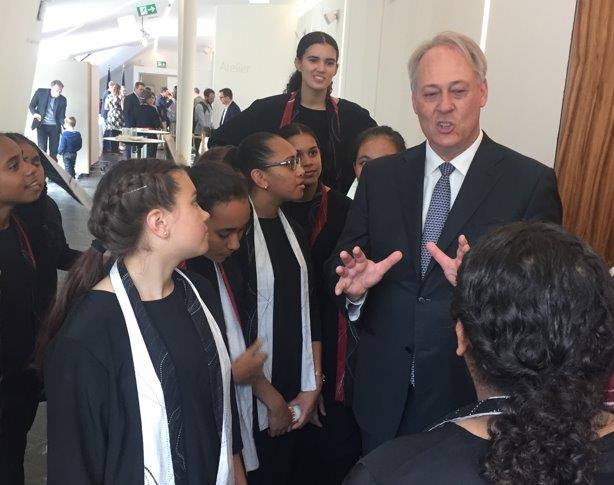
Ambassador Dr Brendon Hammer talking to GICC choristers. Copyright: Australian Embassy.
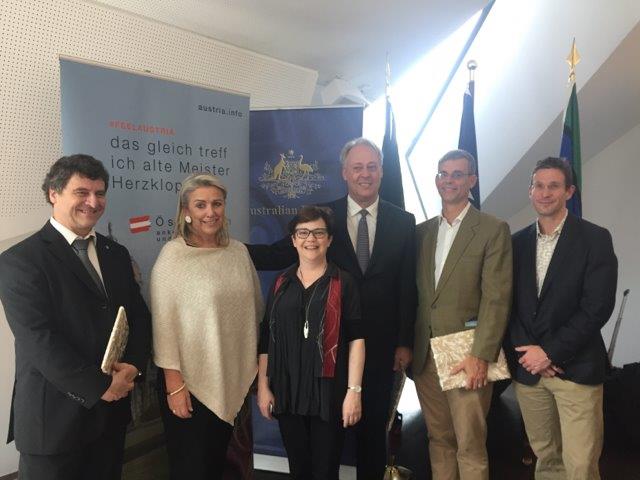
From left to right: Prof Gerald Wirth, Artistic Director Vienna Boys Choir; Astrid Mulholland-Licht, Market Manager, Austrian National Tourist Office Sydney; Lyn Williams OAM, Director GICC; Ambassador Dr Brendon Hammer; Lars Bespolka, Executive Director, Infrastructure, IFM Investors; Werner Kerschl, Investment Director Infrasturcture, IFM Investors. Copyright: Australian Embassy.
Bringing the music, story-telling, and tradition of one of the oldest continuous living cultures on earth to Europe, on 13 and 14 May the Australian Gondwana Indigenous Children’s Choir (GICC) from Cairns, crowned its first European tour with joint concerts with the world-famous Austrian Vienna Boys Choir (VBC) in Vienna. For many of the young Australian performers it was their first time out of Australia.
Ambassador Brendon Hammer welcomed this unique cooperation as an example of successful cross-cultural cooperation and the strong and positive relationship between Australia and Austria.
Performing to standing ovations, the choirs brought together their rich, diverse cultural heritages; building bridges of friendship, culture and cooperation. Traditional Indigenous songs and compositions by Dan Walker, including excerpts from "Ngailu, Boy of the Stars", written specifically for the GICC, met the music of Austrian icons Mozart, Schubert and Strauss. A particular highlight of the concert was the joint performance of Torres Strait Islander songs with both choirs simultaneously on stage.
By rehearsing and performing together in Vienna and visiting the sights of the city, the young singers had a unique opportunity to learn of each other’s cultures. They will have the opportunity to further that exchange later this year when the Vienna Boys Choir tours Australia in October with joint performances with the GICC at the Sydney Opera House and in Cairns.
Watch GICC explore Vienna and perform with VBC here.
This cooperation was supported by many partners, including the Austrian Tourism Office. The GICC’s European tour also included performances with Carmina Slovenica in Maribor, Slovenia, and in Frankfurt, Germany.
Australia’s Participation in the 26th Session of the Commission on Crime Prevention and Criminal Justice (CCPCJ)
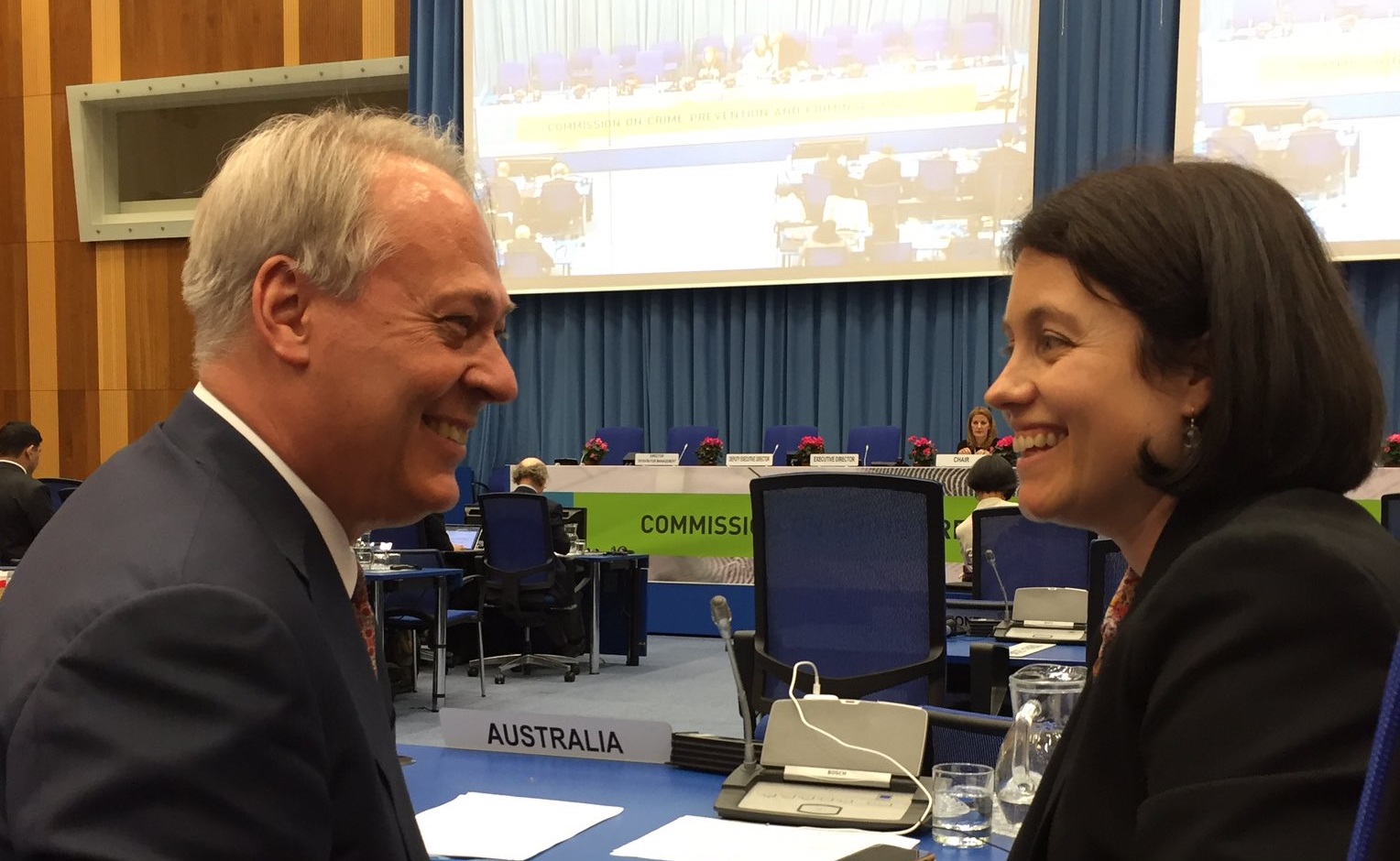
Photo caption: Ambassador HE Dr Brendon Hammer and Second Secretary, Kim Ralston at the 26th Session of the Commission on Crime Prevention and Criminal Justice (CCPCJ) on 23 May in Vienna, Austria. Copyright: Australian Embassy.
The CCPCJ is the principal UN policymaking body in crime prevention and criminal justice.
Gender Mainstreaming
Australia has made gender mainstreaming in criminal justice policies a focus area at this year’s CCPCJ, by partnering with Mexico to introduce a resolution calling on member states to consider the specific needs of women and girls in developing and implementing criminal justice policies.
Australia’s statement at the 26th session of the CCPCJ addressing Australian priorities can be found here.
MIKTA – Addressing Violence against Women
Australia also co-sponsored a side-event with MIKTA partners from Mexico, Indonesia, the Republic of Korea and Turkey on addressing violence against women.
Australia is seeking to challenge the ideas and behaviours that allow violence to occur by driving cultural change from the ground up and has launched an advertisement campaign called “Stop it at the Start.” The campaign aims to help break the cycle of violence by encouraging adults to reflect on their attitudes and have conversations about respect with young people. A link to a campaign advertisement can be found here.
Ambassador HE Dr Brendon Hammer’s statement on Australian initiatives to address violence against women can be found here.
UNODC – Australian Engagement to address Violence against Women
Australia is an active supporter of UNODC projects focussing on gender-based violence against women. We are sponsoring a workshop that will bring together representatives of the police, justice, health and social sectors from 11 countries in Asia and the Pacific, to enhance the knowledge and capacity of policymakers, identify good practices, key challenges and priorities for action at the country level.
Australia's Participation in the 2017 NPT Preparatory Committee meeting in Vienna
The Treaty on the Non-Proliferation of Nuclear Weapons (NPT) came into force in 1970 and was extended indefinitely in 1995. Australia ratified the NPT in 1973.
The NPT is the cornerstone of global efforts to prevent the spread of nuclear weapons, to work towards achieving nuclear disarmament and to promote the peaceful uses of nuclear technology and energy. The NPT is key to achieving global peace, stability and security.
Australia is participating actively in the first NPT Preparatory Committee meeting in Vienna (2-12 May 2017), which is the first of three formal meetings ahead of the mandated 5-yearly review of the operation of the NPT - the 2020 NPT Review Conference.
Read Australia's 2017 PrepCom meeting Statement to learn more about Australia's nuclear non-proliferation and disarmament priorities and our long-standing commitment to the elimination of Nuclear weapons.
Vienna Group of Ten
Australia is proud to Chair the Vienna Group of Ten, comprising Australia, Austria, Canada, Denmark, Finland, Hungary, Ireland, the Netherlands, New Zealand, Norway and Sweden.
The group, established in 1980, urges progress and due consideration of the NPT's so called Vienna issues - the peaceful uses of nuclear energy; nuclear safety, security and safeguards; export controls; nuclear testing and withdrawal from the NPT.
The Vienna Group of Ten's Preparatory Committee statement can be read here, and the Group's Working Paper can be viewed here.
Anzac Day 2017
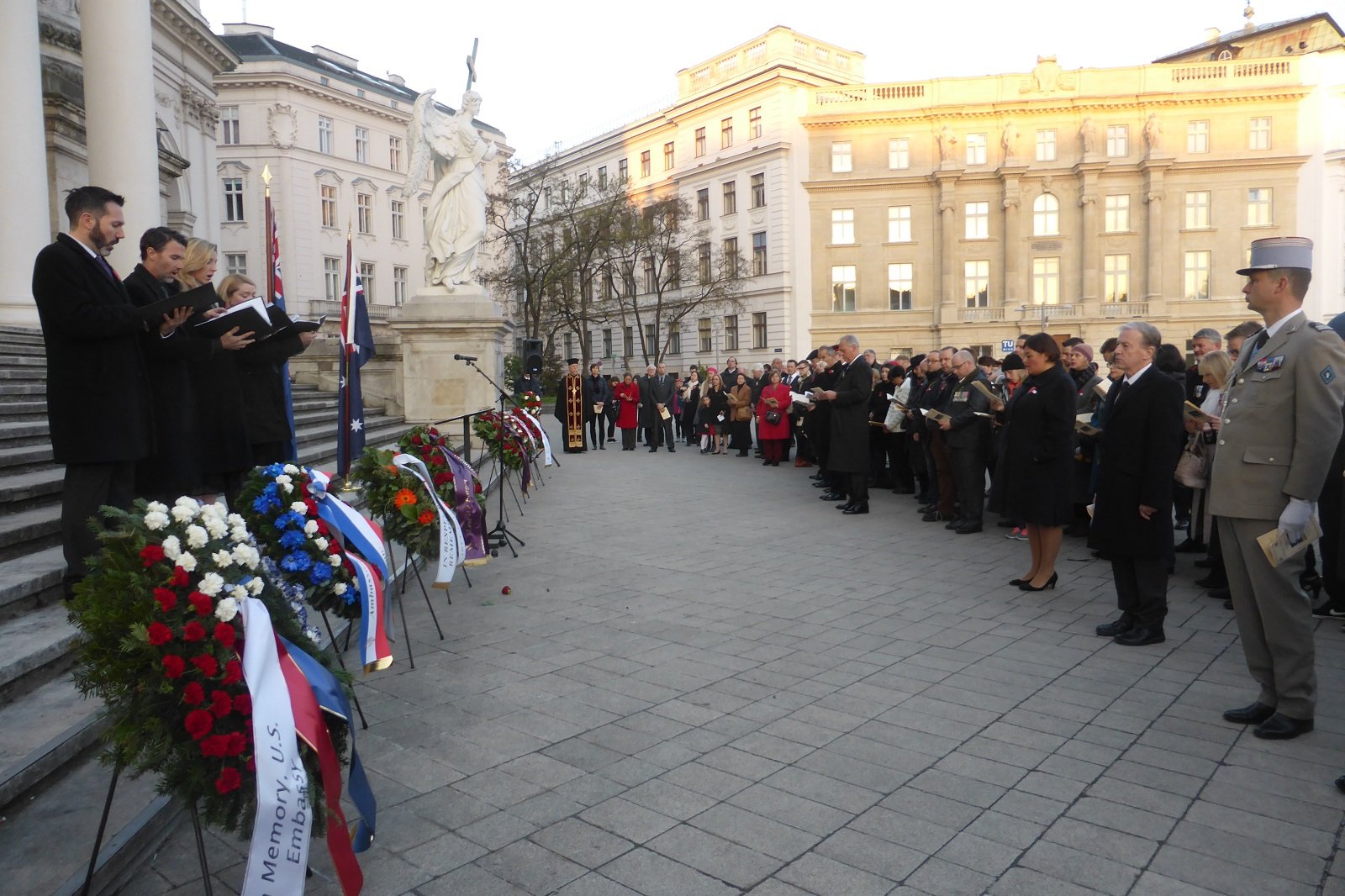
Photo caption: The New Zealand and Australian National Anthems led by the Anzac Day Quartet (left foreground from left) David Corcoran, Tharron McIvor, Anna Voshege, Anna-Louise Cole. Copyright: Australian Embassy.
.jpg)
Photo caption: Laying of wreaths. Ambassador HE Dr Brendon Hammer lays a wreath on behalf of the Government and People of Australia. Copyright: Australian Embassy.
On 25 April, the Australian and New Zealand Embassies commemorated Anzac Day with a Dawn Service held on the steps of the historic Karlskirche church in the centre of Vienna. Representatives from the British, Irish, Canadian, French, Turkish and United States Embassies, and the diplomatic community, stood side-by-side with Australians and New Zealanders, and members of the public, including a Hungarian community group, to mark the occasion.
Countering the world drug problem: Australia’s statement at the 60th Session of the Commission on Narcotic Drugs in Vienna
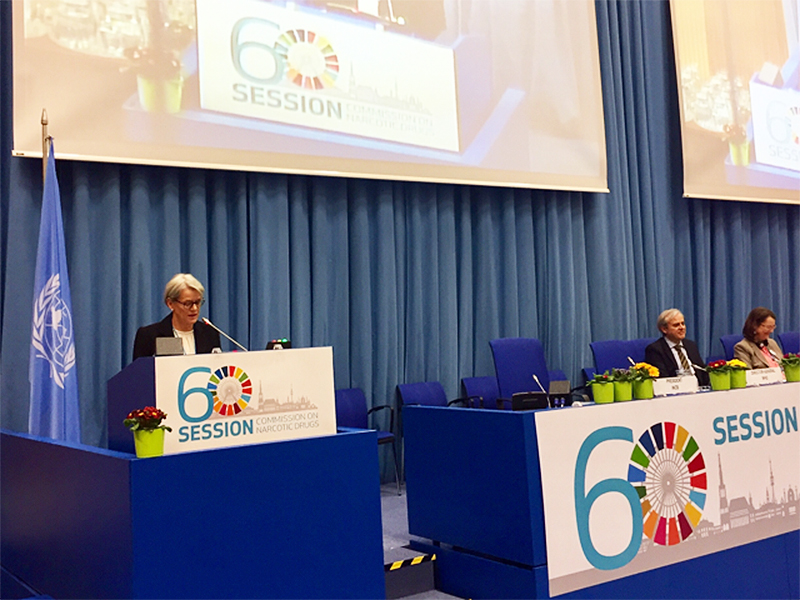
Photo caption: Dr Wendy Southern PSM, Deputy Secretary, National Program Delivery Group, Department of Health, delivering Australia’s statement at the 60th Session of the Commission on Narcotic Drugs (CND) on 13 March in Vienna. Copyright: Australian Embassy.
Dr Southern said that a holistic and multifaceted approach is needed to address the world drug problem effectively. Law and enforcement approaches were vital to reducing supply, while health-based strategies aimed at reducing the uptake of illicit drugs and providing treatment for users were also critical. Australia, she said, is working closely with partners in the Asia-Pacific region to address shared illicit drug challenges, including as a key contributor to the Global Synthetics Monitoring: Analysis, Reporting and Trends Program (SMART), which aims to counter the synthetic drug problem through support to governments, including in the East and South-East Asia region.
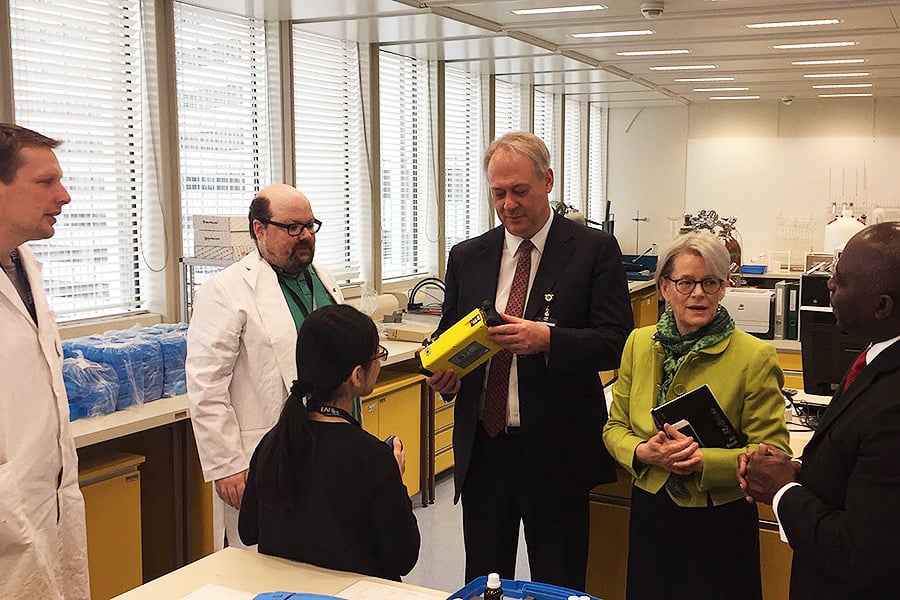
Photo caption: Australian Ambassador Dr Brendon Hammer (fourth from left), and Dr Wendy Southern PSM (second, right), visit the SMART lab, UNODC Vienna. Copyright: Australian Embassy.
Dr Southern also said Australia will continue to advocate for greater access to controlled medicines for those in need around the world and the protection of human rights in addressing the world drug problem. Australia would continue to advocate and pursue these platforms if re-elected to the Commission on Narcotic Drugs for the 2018-21 term.
|
Australia is an active member of the Commission on Narcotic Drugs (CND) and has been a top ten donor |
International Women’s Day 2017: Women in Multilateralism Event at the Australian Residence
The Australian government is committed to the empowerment of women and girls globally. In recognition of this and to mark International Women’s Day 2017, on 1 March the Australian Embassy hosted a Women in Multilateralism event to discuss and consider practical initiatives to advance gender equality in multilateral policy-making. HE Ambassador Bente Angell-Hansen, Norwegian Permanent Mission, and Mary Alice Hayward, Deputy Director General and Head of Department of Management, International Atomic Energy Agency (IAEA), provided insights and engaged in discussion with participants on the far-reaching benefits that can derive from gender diversity at national, sectoral as well as organisational levels.
Photo caption (from left to right): Norwegian Ambassador HE Bente Angell-Hansen, IAEA Deputy Director General Mary Alice Hayward and Australian Deputy Head of Mission Alison Drury. Copyright: Australian Embassy.
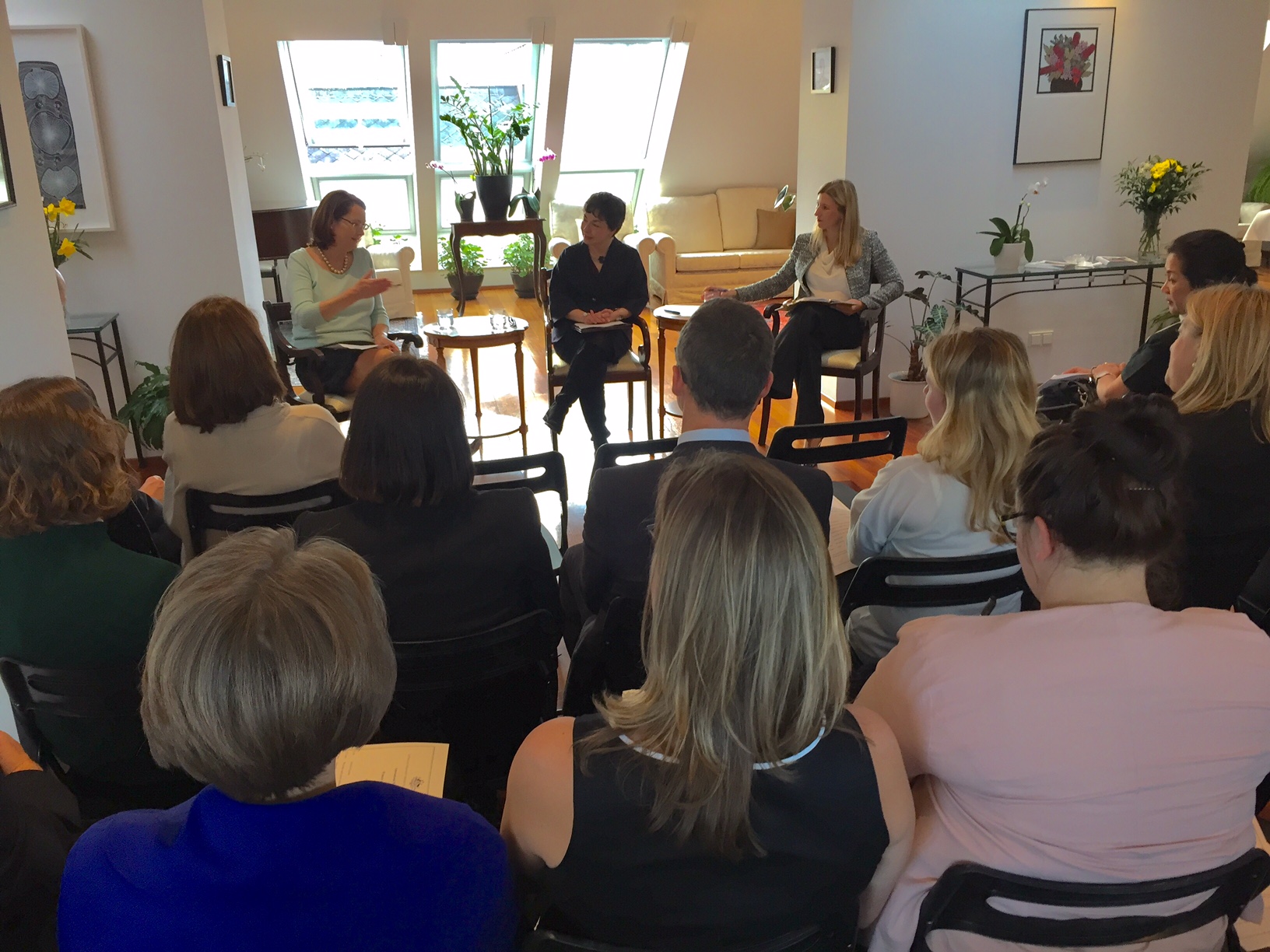
Photo caption: Panel discussion at the Australian Residence. Copyright: Australian Embassy.
The event provided an opportunity for attendees to discuss practical initiatives that could be taken forward within and across multilateral agencies in Vienna. Ways to draw women into STEM (science, technology, engineering and mathematics); creating career opportunities for women including through mentoring, networking, and sponsorship; the importance of role models and gender champions; and achieving a work-life balance were prominent themes. The importance of considering and reflecting gender in the drafting of resolutions, and facilitating and maintaining an on-going discourse and awareness of the gender agenda were also identified as key objectives.
To learn more about the Australian Government’s commitment to the economic social and political empowerment of women globally, please refer to the publication Australia Advancing Women’s Economic Empowerment through Aid, Trade and Economic Diplomacy.
Australia Supporting the IAEA’s Peaceful Use of Nuclear Technology
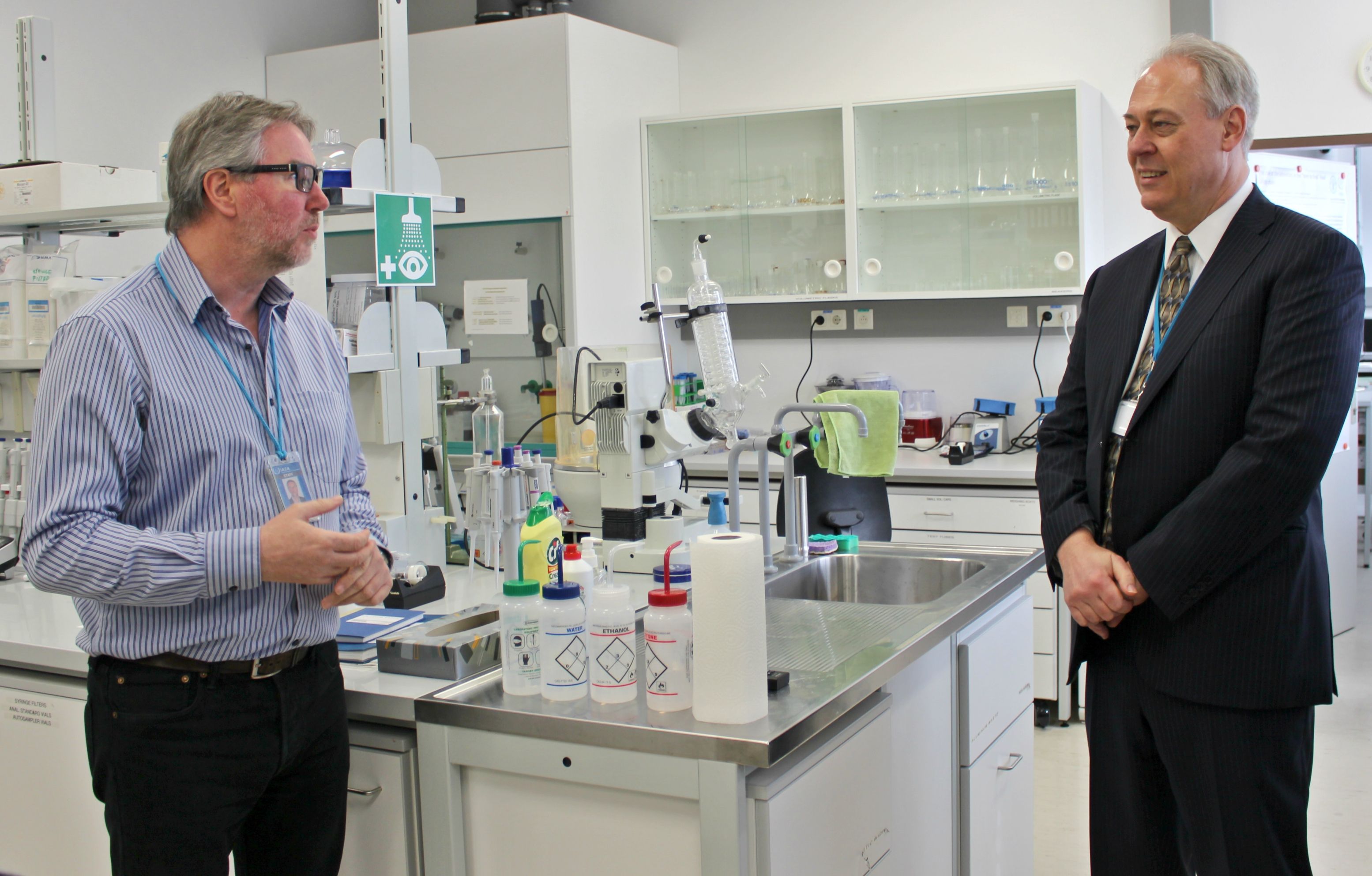
Photo caption: Ambassador Dr Brendon Hammer (right) talks to Dr Andrew Cannavan, Head of the IAEA’s Nuclear Sciences and Applications Food and Environmental Protection Laboratory, Seibersdorf. Copyright: IAEA
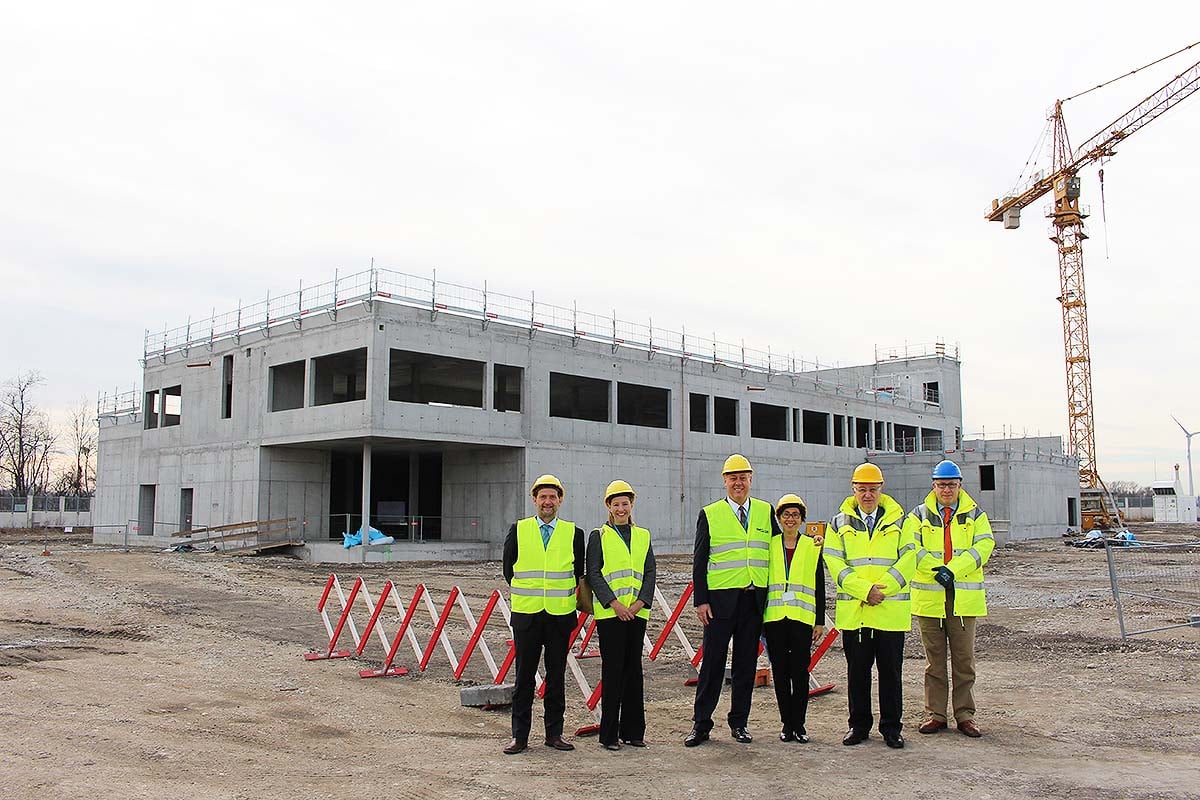
Photo caption: Inspecting construction works to upgrade the IAEA’s nuclear application laboratories at Seibersdorf to which DFAT has pledged EUR 600,000. Copyright: IAEA
Nuclear technology is being used in a multitude of sophisticated ways and directly contributes to nine of the UN’s 17 Sustainable Development goals – including in developing diagnostics and treatments for cancer and other diseases, and making breakthroughs in clean energy production. The International Atomic Energy Agency laboratories at Seibersdorf, Austria are using nuclear science to advance :
- Human health by developing dosage standards for cancer treatments;
- Animal health through control of transboundary animal disease and improved livestock productivity;
- Plant breeding and genetics – to improve crop yields and the hardiness;
- Food safety by tracing food origins and identifying contaminants;
- Soil and water management to ensure sustainable and efficient use of water; and
- Pest control – including through the sterilisation of insects.
In recognition of the important contribution the IAEA is making through the peaceful application of nuclear technology, in 2015 the Australian Department of Foreign Affairs and Trade pledged EUR 600,000 to upgrade the nuclear applications laboratories at Seibersdorf. Building works, which will realise the construction of two new laboratories, are scheduled to be completed in 2018.
On 28 February 2017 Australian Ambassador Dr Brendon Hammer visited the Seibersdorf laboratories to inspect the ReNuAL construction and learn about the important work being carried out by IAEA scientists.
Australia is proud collaborative centre partner of the IAEA through the Australian Nuclear Science and Technology Organisation (ANSTO). Find out more about ANSTO’s nuclear science and technology activities which include its research, management of landmark infrastructure (including the OPAL research reactor) and its substantial and increasing contribution to the global supply of medical radioisotopes here.
Zero Project: Australia’s JobAccess Service recognised with a 2017 Innovative Policy Award
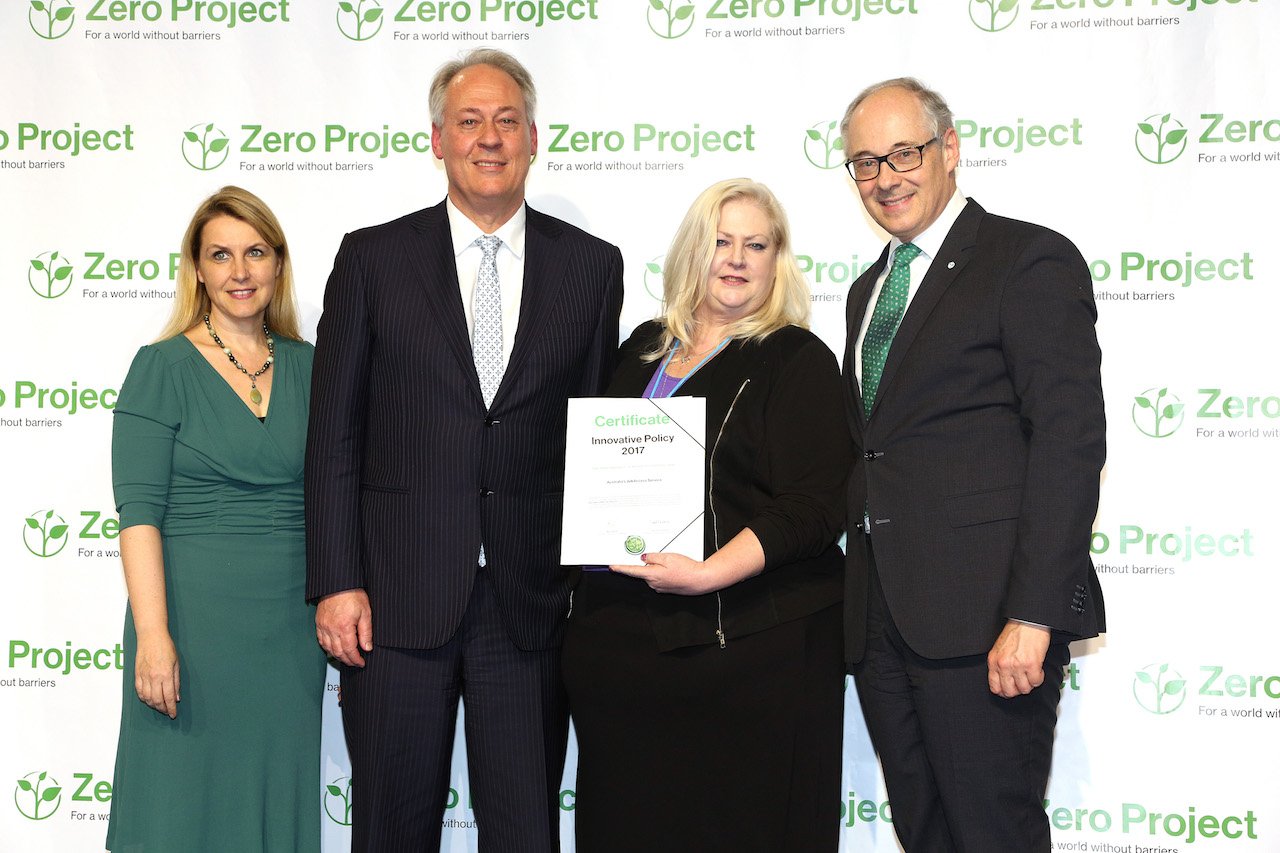
Photo caption (l-r): Ms Alexandra Wandel, Director, World Future Council; Ambassador Dr Brendon Hammer; Ms Helen Green, Disability Employment Services Branch, Australian Department of Social Services; Mr Martin Essl, Founder of the Zero Project. Copyright: Zero Project
On 23 February, Ambassador Dr Brendon Hammer and Ms Helen Green proudly accepted an Innovative Policy award on behalf of Australia’s JobAccess Service at the Zero Project Conference in Vienna. The award recognised JobAccess’s contribution to advancing employment of persons with disabilities. JobAccess supports employers as well as people with disability through services including workplace adjustment, vocational training, recruitment strategies for sustainable employment, flexible workplace practices, workplace training, workplace assessment and work health and safety. JobAccess also educates employers on the benefits of employing people with disability and the government supports available.
The Zero Project is an initiative of the Austrian Essl Foundation which supports the implementation of the United Nations Convention on the Rights of Persons with Disabilities and focuses on the rights of persons with disabilities globally. Its annual conference allows organisations responsible for the development of innovative policies and practices to present solutions to peers, stakeholders, government ministers and other key influencers.
The 2017 Zero Project Conference focused on disability-inclusive employment, work, and vocational education and training. The award was handed over by Martin Essl, Founder of the Zero Project, and Jakob von Uexkull, Partner of the Zero Project and Founder of the World Future Council, in the United Nations Office in Vienna.
The Zero Project Conference was attended by more than 500 experts from more than 70 countries.
